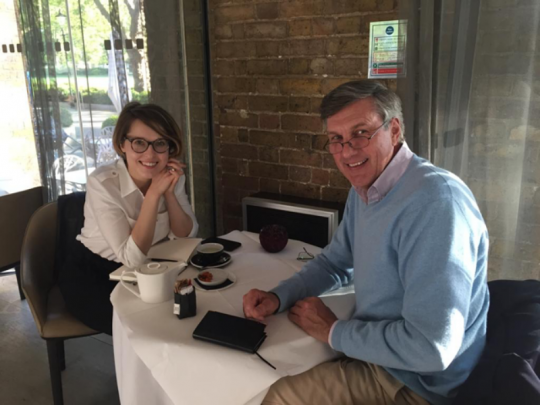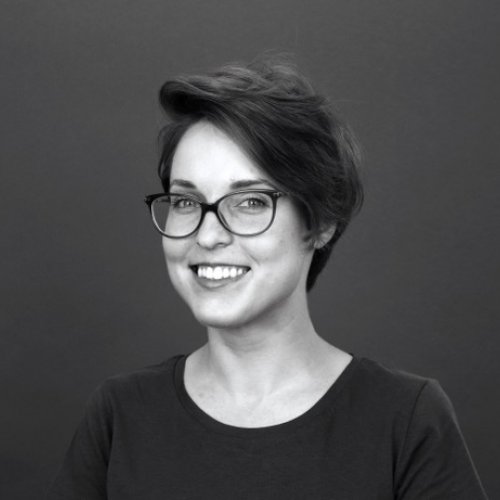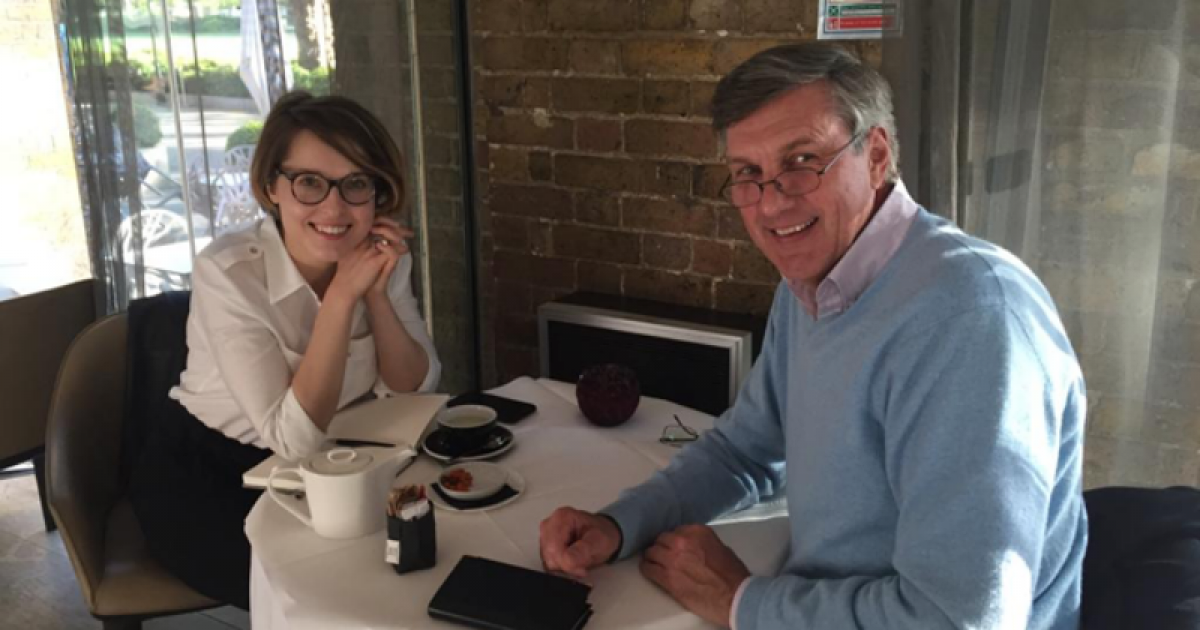“Experiencing Kindness, It Feels Like a Breath of Fresh Air”
Ausrine is an experimenter and a clear thinker, energised by challenging scenarios and transformative tech. She has 7+ years of experience in business development and strategic partnerships, mostly in acute and specialist healthcare environments. She is currently working for digital health and AI startup in London, having moved there after several years at GE Healthcare. Ausrine absolutely loves the dynamism and the energy of an early stage start-up and she would like to think that she will spin off her own venture in the future as well.
Q: Tell us a few things about your country, and also your life's story!
A: I grew up in Vilnius, Lithuania. I’m part of the generation that was born immediately after the collapse of the Soviet Union which placed us in a great observational spot - seeing the tensions between the West and the East and the search for a new cultural identity.
As I wanted to start my academic and professional life in biomedical sciences, I did an undergraduate degree in Pharmacology in Manchester. From there on, I moved to the South Coast to do a postgraduate degree in Innovation Management. After a couple of internships in between my degrees, I finally moved to London. I often remember the idiom “all roads lead to Rome”, except that in this case, it’s London. It feels like everybody has or will have some or other business in this city! After a few great years and a couple of roles at GE Healthcare and meeting an amazing circle of women in health tech, I started working at a digital health startup in London. I’m now working in a strategic and transformation role, towards the goal of bringing meaningful and sustainable technological change to the National Health Service.
Q: What is your view of the world as it is today? And how do you define the concept of a better world?
A: Whether we’re talking about economic, social, education or population health development, it’s so easy to throw countries or entire regions off balance. It’s a moving, breathing tapestry of fights over power, influence, relevance and resources, and there has always been a losing side. To take on a more futuristic outlook, I was recently reading about “technological singularity” as a point of societal transformation and I tend to side with the optimists on this matter. Technology and AI aside, I think good leadership (in the broadest sense) is about having a deep and nuanced contextual understanding and empathy. A better world should come with better, more responsible leadership (whether we’re thinking local, national, global, or corporate). It’s less about making things happen by brute force and more about accepting that every action will bring a reaction, and owning the consequences. I’d love to see a more equal, healthy, free world in my lifetime but in reality, this sort of shift takes generations. I hope for and wish to contribute to doing the right thing.
Q: What are some of the key challenges in your society?
A: It’s easy to turn away and regard different people as “the other” - somebody different, less human, without the richness and complexities of human life. This mindset often allows people to justify discrimination, exclusion and inequality. Right now Europe is in the midst of a strange clash between global and local needs and influences, the Right vs the Left, “us” vs “them”. I’m a fan of heated and productive discussions on a local or governmental level, however, as the rhetoric often turns openly discriminatory towards certain groups, it makes me uneasy. The fractures in Western societies seem to be getting deeper, often fuelled by ethno-nationalist ideology. It’s worth digging deeper - this socio-political shift has been shaped by the recent economic downturn and somewhat slower than expected recovery. Combined with the inevitable change in the geo-political landscape, societies tend to react defensively, by reasserting their identities and societal relevance in opposition to “the other”. I think that two key overarching themes are resources and status, and together they are weaving a forever repeating story of inequality and power struggles.
Q: As a young individual what are a few of the hurdles that you had to overcome up until today?
A: As I started working, I found myself often lacking in confidence and was going through a lot of uncertainty, anxiety and self-doubt. Arguably, these are very common human experience. However, I can now also see that meeting the right people at the right time can be incredibly helpful. I would call them “role models”, or simply talented individuals I was looking up to for their skills. They are leaders, innovators, people with incredible interpersonal and communication skills, accidental coaches, great thinkers, problem solvers and human connectors. GE was a great place to meet them (the affinity networks in particular), as well as was the One HealthTech network I met in London (run by the coolest women in this field).

Q: Why is the role of a mentor important for you?
A: I found mentorship and coaching incredibly helpful in building confidence and a sense of empowerment. I think mentoring is a pretty broad concept and could include anything from knowledge sharing to deeper, more personal conversations. Whether it’s a problem that I need help with, seeking an unbiased opinion or just somebody to challenge my own way of thinking, a mentor can help with that in a constructive and safe environment. The exchange doesn’t just end with two people as I often find myself sharing the learnings and experiences with my peers and other circles. I cannot stress enough the benefits of having a good circle of mentors in life, however, finding the right people could be daunting.
Q: Do you have a lesson that life has taught you and you would like to share?
A: Kindness and empathy. It’s too easy to judge, disagree with, confront or snap at people without ever understanding what’s driving them. It’s not an easy skill to develop, however, when I see or experience it, it feels like a breath of fresh air.
Q: Name a project, a foundation or a person in your country that you think is doing great work in helping improve other people's lives!
A: Lilija Henrika Vasiliauskienė - she’s the director and the founder of an NGO called “Vilniaus Moterų namai”. The organisation is helping and supporting women who experience violence at home.
Q: What are some of the challenges that women in your country face and what efforts are made towards gender equality?
A: Lithuania ranks below the EU-28 average in the Gender Equality Index and the main causes for this lag cluster around the domains of power and time. Once you take a closer look, it’s easy to notice that a lot of this inequality is stemming from deeply rooted societal prejudice against women. It’s the language, the inappropriate jokes that one hears/sees in the media and during political debates. There’s also a stubbornly popular belief that women’s empowerment puts family stability at risk. It was really disappointing to realise that I had very few women role models in my late teens-early twenties (my mum excluded, of course!) which could make a very interesting analysis of the media, education and social influences of that time. However, things are getting better. The best sign of change is the debate about gender equality in the public domain. Whether it’s coming from the top or is grassroots led, a well constructed and informed discussion is helping the society grow and develop.
Q: Athena40 is the first ever global selection of the top 40 women forward thinkers, commentators, activists, authors, academics, entrepreneurs, executives, innovators. Can you think of a truly innovative and forward-thinking woman from your country that you wish to nominate for the Athena40 global list?
A: Žydrūnė Vitaitė (https://www.linkedin.com/in/%C5%BEydr%C5%ABn%C4%97-vitait%C4%97-166a1914/?originalSubdomain=lt) - cofounder of Women Go Tech initiative. It’s the first mentorship program in Lithuania to encourage women to choose their career in ICT and engineering.
Q: Share with us a phrase, a poem or a story that you love or you find interesting!
A: I’d like to give a shout out to the Radiolab podcasts crew. Their stories are incredibly rich and flawlessly produced. They will leave you entertained, amused and intellectually stimulated.
Q: Tell us one thing that you have learned from your mentor.
A: “You don’t want to throw yourself at a moving train”. My mentor said it to me as we were discussing a company decision I wasn’t entirely comfortable with. It’s a very level-headed advice and the point is that there are a lot of smart ways of dealing with issues without having to cause a collision.



